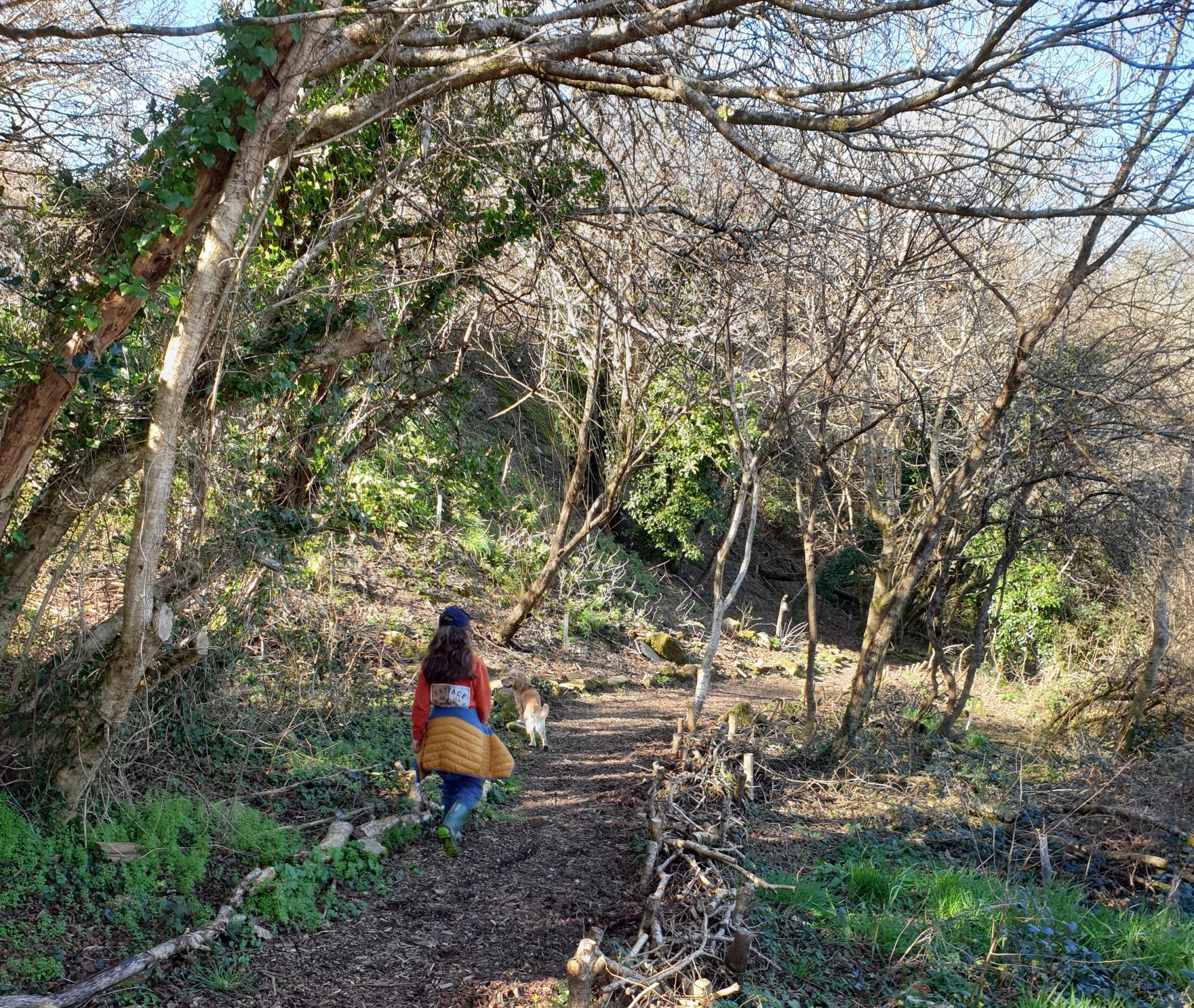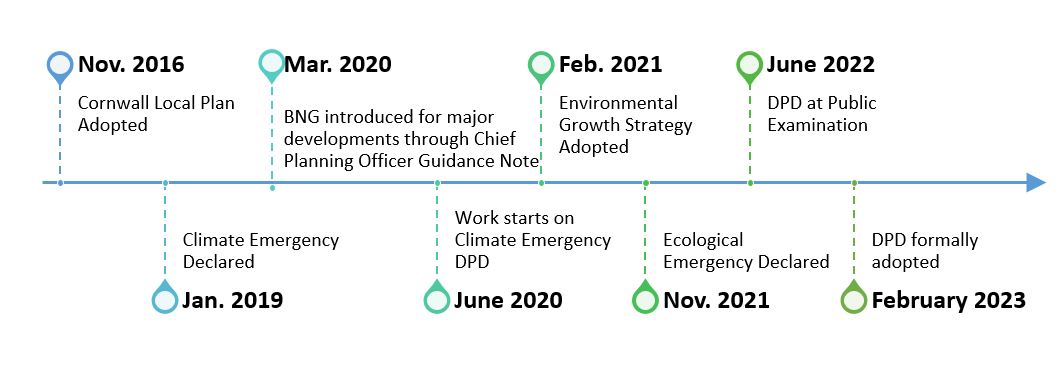Cornwall Council used its wider corporate commitments to justify the introduction of Biodiversity Net Gain (BNG) requirements for all major developments ahead of the implementation of mandatory BNG. Please note - Councils developing BNG approaches in advance of its mandatory introduction may have to adapt their approaches to comply with the details of legal requirements in November 2023.
Introduction
Cornwall Council used its wider corporate commitments to justify the introduction of Biodiversity Net Gain (BNG) requirements for all major developments ahead of the implementation of mandatory BNG.
Background
Adopted in 2016, Cornwall Council’s Local Plan identifies sustainable development as its core vision. It refers the need for development to avoid negative impacts on biodiversity and to ‘enable net gains by designing in landscape and biodiversity features and enhancements’.
In January 2019, Cornwall Council declared a Climate Emergency and committed to the publication of a climate action plan. The subsequent publication of its Environmental Growth Strategy set out Cornwall’s long-term framework to conserve and enhance nature. The strategy recognises the Government’s commitment to the introduction of mandatory BNG under the Environment Act.
In 2020, Cornwall was chosen by Government as one of five areas nationally to be a Nature Recovery Pilot and develop a draft Local Nature Recovery Strategy. The council also announced an Ecological Emergency after the COP26 Climate Summit in November 2021.
Timeline
The project
Cornwall Council’s embedded corporate-wide commitment to nature recovery led to a desire for early implementation of BNG requirements ahead of mandatory net gain in 2023.
It took around five months to prepare for the initial introduction of BNG requirements as part of planning decisions for new developments. This included the introduction of BNG as an agenda item at the Planning Agents’ Forum, introductory sessions for Planning Officers and the writing of guidance, planning conditions and template Section 106 agreements. The Chief Planning Officer Guidance Note was published in 2020, stating that:
‘From 1st March 2020 all major developments must demonstrate at least a 10% Net Gain in Biodiversity’ and that this gain is expected to be ‘achieved within the application site boundary’.
Shortly after the Chief Planning Officer guidance note was published, Cornwall Council started working on preparing a Climate Emergency Development Plan Document (DPD). They decided to integrate BNG and nature recovery objectives into this DPD. The DPD states:
‘All development proposals will be required to provide a measurable increase in biodiversity’ including minor developments which will use a ‘simplified net gain process based on a Cornwall Council approved Small Sites Biodiversity Metric’
Cornwall Council recognised that upcoming national guidance and legislation relating to mandatory BNG will influence the implementation of the DPD in Cornwall and used flexible language throughout its BNG policy to account for this. For instance, Cornwall Council requires the use of the the latest version of the Defra Biodiversity Metric, but explicitly identify their intention to recognise ‘any subsequently approved Biodiversity Metric’.
Following an independent examination in November 2021 and publication of the Inspectors report the DPD was adopted in February 2023.
Challenges and solutions
The justification of BNG requirements before the introduction of mandatory BNG:
Cornwall Council’s early adoption of BNG requirements through a Chief Planning Officer’s note was made within the limits of existing planning policy. To a certain extent, this limited Cornwall’s capacity to implement BNG. While there was relatively little pushback from developers on the use of a Chief Planning Officer’s note requiring 10% BNG, some applications argued for BNG below the 10% net gain on the basis that BNG was not yet mandatory and that any ‘net gain’ was acceptable as this was in line with the NPPF.
Cornwall’s Council’s wider corporate commitments to nature recovery acted to strengthen the Council’s introduction of BNG requirements prior to mandatory BNG. Its Environmental Growth Strategy was also supported by previous mapping of local nature recovery networks, produced by a partnership between the University of Exeter, Cornwall Wildlife Trust, Cornwall Council and Cornwall Development Company, provided Cornwall. This mapping provided Cornwall with opportunities for greater green infrastructure and positioned BNG requirements within a council-wide agenda on environmental action, ultimately adding greater weight to their BNG policy.
Limited ecological resources:
Cornwall County Council employs one full-time ecologist. The introduction of mandatory BNG on major developments creates a significant demand for additional resources to review incoming planning applications and respond to queries, particularly as it a new requirement for many developers who have not previously submitted BNG reports.
Cornwall Council has been offering weekly online ‘drop-in’ sessions with the ecologist to answer BNG queries and concerns from developers. Cornwall Council feel that this has been useful in reducing the number of individual queries the ecologist answers.
On-site vs off-site provision:
As Cornwall Council is one of the early adopters of BNG requirements in development applications, one of the central challenges concerned how a net gain could be achieved if it was not possible to achieve on-site.
Only a small number of development applications to Cornwall Council have resulted in off-site BNG provision. Both the Chief Planning Officer’s note and the incoming DPD details a clear preference for on-site delivery and states that only when other options have been exhausted will off-site delivery be permitted and secured through Section 106 agreements. The off-site provision has mainly been secured on adjacent land to the site boundary within the applicant’s ownership.
Cornwall Council are currently pooling contributions made via Section 106 agreements. They are preparing to use the contributions to have sites and projects ready to offer directly to developers to secure net gain ready for the introduction of mandatory BNG in November 2023.


